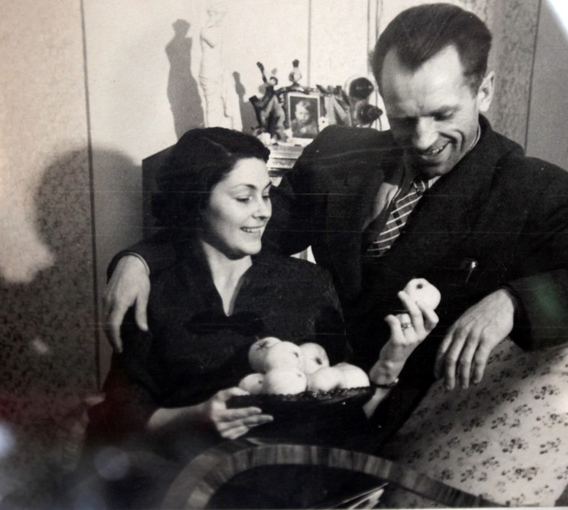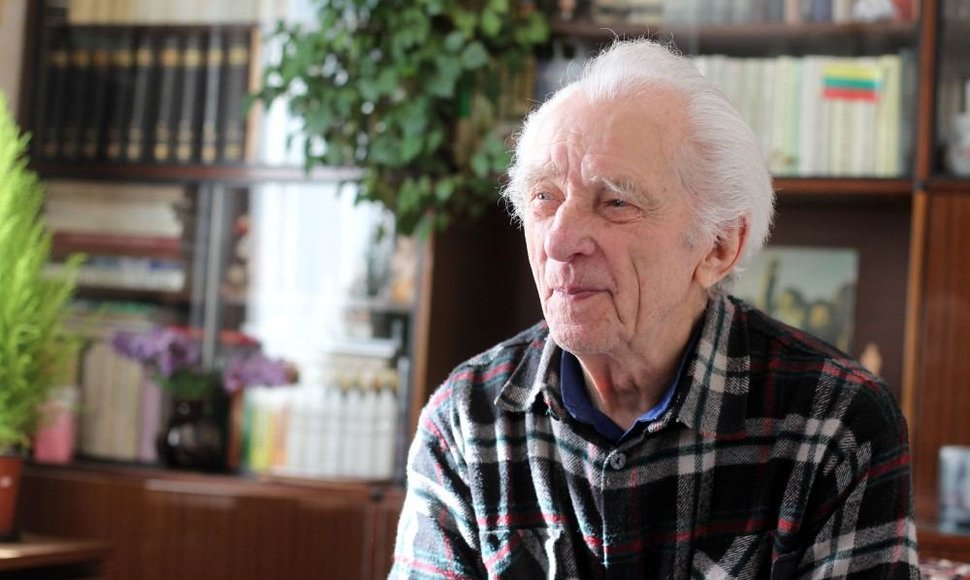“I went through hell. Stutthof was a camp for exterminating people. Why is God still keeping me here? Perhaps to tell others about the things I saw?” Telksnys sighs. Despite his venerable age, the man still boasts excellent health and lucid mind.
However, during an hour-long conversation with 15min, such minor chords were few. Vladislavas, who lives with his 92-year-old wife Danutė, tells his story with humour reminiscent of Balys Sruoga, another Lithuanian and a famed author who described his experiences in Stutthof in “The Forest of Gods”, a novel that has become part of the Lithuanian literary canon.
“Under the Germans, everything was in order. One woman requested that they send her the ashes of her husband who died in a camp. And they did. This is what I call the German order. Of course, they must have scooped the ashes from a communal pile,” Danutė and Vladislovas say.
 |
| Vladislovas and Danutė Telksniai (1954-1955 m.) |
Telksnys, who was working as the administrator of a printing house, was arrested by Germany's secret police on 27 April 1943, along with 15 other Kaunas intellectuals in the press business, the so-called Press Group. The Gestapo agents did not bother to interrogate the detainees or investigate anything. The Lithuanians were sentenced without further ado. Two days later, they found themselves in Stutthof where they spent almost a year. Gold collected by fellow Lithuanians and handed over to the Gestapo opened the concentration camp gates for them.
Upon returning home, 29-year-old Vladislovas weighed 38 kilograms. Very soon the Gestapo took interest in him again, so the man changed his name and, as Vladas Lankaitis, settled in Saločiai with his family. The Soviet security services discovered his true identity three decades later.
The man worked as a paramedic and wrote several books describing his experiences. At the moment, Telksnys is the only living survivor of Stuthoff, one of the most severe concentration camps in the Third Reich that operated between 1939 and 1945. Over 60 thousand people of many nationalities met their end there.
– 70 years ago, you were taken to one of the most cruel Nazi concentration camps. What can you recall?
– Memories have faded since. I have experienced much suffering in my life, so it all got mixed up. I cannot recall many a thing, nor do I think of it much. Would it help if I did? Everything sinks into oblivion almost automatically, without giving it much thought.
But if people ask me, I do tell them. I went through hell. Stutthof was a camp for exterminating people. Those who call it a disciplinary camp or otherwise, they are telling lies. When they took us there, I saw a pile of ashes of people burnt in the crematorium, a pile perhaps bigger than my house. There were three furnaces that would be kept working day and night. A smell of burning flesh permeated everything.
– What were your first impressions in the camp?
– We knew what lagers were. On the way, one Russian – or was he a Jew? – began relating what he knew about them. We, Lithuanians, thought: What rubbish is he telling us, this half-wit, can it be possible? Later, though, I apologized that man in my head for snubbing him undeservedly. Stutthof was worse than he had told us.
As we arrived, we saw a mountain of ashes, two sets of gallows, and we realized – this will not be a piece of cake for us. Indeed, there was no cake.
Officially it was Germans who ran things, but most of the beatings we took came from Poles. Germans knew how to wash their hands, they handed over all management to Polish inmates. Our wardens were fellow prisoners. Nasty, cruel people. One killed his own brother in Stutthof. Life was tough in the camp.
– You once mentioned that when you returned from the camp, you were 29 and weighed merely 38 kilograms.
– Indeed. I was but a shadow of a man. Food in the camp was appalling. Not unlike in other camps, we were fed cabbage glob without a trace of meat. They'd give us some bread, all soaked. Good God, what we had to endure, my heart sinks when I talk about it.
Funny, though, that after so much woes I lived to be so old. My friends, fellow people of the press who were taken with me, are all gone now. I am alone. Why is God still keeping me here? Perhaps to tell others about the things I saw? I am in excellent health, given my age. My wife, too, looks well below her age.
– You have suffered both under Nazis and Soviets. How do they compare?
– I was imprisoned under the Germans and I was imprisoned under the Russians. Both interrogated and tortured me. The German interrogation was a laugh. They'd pay no attention to what you say – they'd sentence you and that's that. They wouldn't get their hands dirty – off to Stutthof and stay there until you kick the bucket. Even today, as I pass the Labour House (now, Kaunas Arts Centre on Vytauto Avenue) where the Gestapo was housed, I glance through a window into the room where I was interrogated.
Whereas the Russians did a thorough job. They kept threatening to send me to a firing squad. I said to them: “Well shoot me then. You keep threatening me but don't do it.” And they replied: “Hold on, all must be done properly. First, you will tell us everything and then we'll shoot you.” – “And what if I don't?” They reassured me: “You will, don't worry.” When they started their interrogation, I realized that I might indeed tell them everything. They were cruel, wanted you to tell on your friends so they could discover who was commanding (the resistance). So you had to take a beating every once in a while.
– You've lived to see old age and are still in a rather good shape. While in Stutthof, did you expect you'd survive, come back to Lithuania, see it independent again?
– We did not think about independence – but were very happy when it happened. Yet we did hope to get out of the camp, at least at first. We thought they'd investigate us, discover we were innocent, and let us go. We made pleas to justice. No one paid any attention to our pleas, though, just gave us a beating.
– You came very close to death in the camp. How did you manage to escape?
– I came down with dysentery upon my arrival. We called this disease “sračka”, just like Poles. I must have gotten it by drinking swamp water – I was so thirsty. So they laid me naked, on the second row of bunks, I thought this was my end.
There was a Lithuanian doctor, Starkus, who did not help me directly, but he asked a Latvian doctor to look after me. True, it wasn't much of a therapy – just a piece of coal for me to suck on when I shit in blood and mucus. I was cured by the flitch sent to me by Danutė. True, the Latvian doctor warned me to eat it very slowly.
Danutė Telksnienė here interrupts, laughing: “We didn't have any flitch ourselves. Everything was in short supply under the Germans. Mother would go to farmers and trade needles and other things she bought in the village for flitch. The Deutschmark was worthless then. If he had received all the packages we sent him, he'd have eaten 2 kilos every week, he'd have gotten fat. But only a tiny fraction of we'd send actually reached him.
“We also sent onions, cigarettes. Even though he didn't smoke, my friend advised me that he'd find good use for them in the camp. Under the Germans, cigarettes were very expensive. You could only buy them in the market.
“When my husband returned, he told me about how doctor Starkus saw a Lithuanian sign sewn on clothes in a pile of dead bodies. He came closer and saw that the Lithuanian man (it was Telksnys) was still alive. So he pulled him out of the pile and took to hospital. But not to his own ward, to the Latvian's.”
– The so-called Press Group were incarcerated in Stutthof on 29 April 1943. One year later, in early March 1944, however, there came an order from Berlin to release 14 out of 16 inmates who were still alive. Do you know the reason behind the decision?
– We were greatly surprised by the news. Others – Russians, Poles – had been telling us that we'd never be released, at best moved to another camp.
Telksnienė: “I always believed he'd come back, because that was what the Gestapo men kept telling me. They were very civil, even pleasant. Lithuanians had access to the Gestapo, some even worked for them. Business could be done if you had money – that's how people would learn things. I was told that money was being collected and that the Lithuanian inmates would soon be released from the camp. It was gold that did the job. It bought the entire Press Group out of imprisonment.
“We, the wives of the inmates, would meet every month to share news. Once, a woman came to our meeting. We discovered her husband had died. She asked Germans to send her his ashes. And they did. This is what I call the German order. Of course, they must have scooped the ashes from a communal pile.”
– In 1944, soon after you'd returned from Stutthof, the Gestapo took note of you again. Your friends helped you get a new passport, where you went by the name of Vladas Lankaitis, and you left Kaunas for Ukmergė and later settled in Saločiai. You lived under the fake name for 33 years. How was life under an assumed identity?
– I got used to it and even forgot the name Telksnys. though I changed it back 33 years later. I had grown in the countryside, I am a child of fields, that's why I chose the name Lankaitis (meaning “the son of meadows” in Lithuanian). I had friends who could counterfeit documents – they did beautiful work with passports.
– How did the Soviet security bust you?
– It was something I'd always anticipated, with unease. When I went to see the security people, I knew at once they had figured everything out. They took away my counterfeit documents. I was investigated for three or four years, but then they left me alone.
Telksnienė: “They rang on the phone, I picked up, they wanted to speak to Lankaitis. Invited him to come to their headquarters. Little wonder – people had been speaking that he was living under an assumed name. When all came to light, we were ordered to leave Saločiai. We moved to my native Kaunas. I am glad we did. While the investigation was ongoing, we bought a little house and propped it up.
– Cinema director Algimantas Puipa made a film based on Balys Sruoga's novel “The Forest of Gods”. You were very critical of the film. Have you changed your opinions since?
– He made a piece of nonsense. What business of his was it to make this serious and painful episode into a mockery, a piece of absurdity? He knew I was still alive, he could have come to me and talked, I would have told him (Puipa) everything. There was no such thing like a Gestapo officer marching and a woman with an umbrella following behind. There were no such things.
People were killed there. My wife and I have visited Stutthof. They have a museum there now. Grass doesn't grow on the spot where the pile of ashes stood. Apparently, farmers took the ashes and scattered them in their fields as fertilizer.















